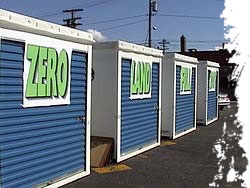
Taking the Sting Out of Sustainability
Michael Dungan & Co. Create a Buzz With APISync
 When it came to devising a business plan for his new company, Michael Dungan looked to the Apis mellifera, better known as the honeybee. "Bees are efficient and effective creatures. They’re also very collaborative, and they leave little waste," Dungan explains. In short, honeybees pollinate and harvest; they have a straightforward but important job.
When it came to devising a business plan for his new company, Michael Dungan looked to the Apis mellifera, better known as the honeybee. "Bees are efficient and effective creatures. They’re also very collaborative, and they leave little waste," Dungan explains. In short, honeybees pollinate and harvest; they have a straightforward but important job.APISync, Dungan's company dedicated to collaborative community efforts toward sustainability, derives its name from the genus of the honeybee. The goal of the company is to collect unwanted materials from manufacturers, suppliers and specifiers (pollinate) and give them to local organizations and people who can make good use of them (harvest). Dungan created a template for this service, which he uses locally and has taken to other communities around the country.
In Northeast Ohio, APISync incubates ZeroLandfill, a summer-long beneficial reuse program that supports the supply needs of local artists and art educators while reducing pressure on local landfill capacity. Interior designers, architects and specifiers are asked to collect their unwanted samples. These include discontinued or discarded carpet tiles, laminate chips, upholstery swatches, rubber flooring samples and wallcovering books, which are in turn distributed to places where they can be put to good use. Upholstery swatches, for example, can become a source of inspiration for an artist. A large carpet sample may be transformed into a sitting area for a grade school art class. Since early June, ZeroLandfill Northeast Ohio has distributed nearly 50,000 pounds of items that otherwise would have ended up in the waste stream.
Dungan brings his bio-inspired idea to other regions through workshops and consultations and explains to interested parties how to develop their own system of community-focused sustainability. To date, APISync has helped to create similar pilot programs in Boston and Cincinnati and is currently working with organizations in Akron, Louisville and Minneapolis/St. Paul.
The premise for APISync isn't rocket science, but that doesn’t make it any less effective. Sometimes a person just has a V-8 moment, and everyone else hits their forehead with the palm of their hand and says, "Why didn't I think of that?"
In Dungan’s case, his V-8 moment evolved over 25 years in the buyer-procurement field. "For the last ten years, I was with BIE [Business Interiors and Environments, a local office furniture dealership focused on sustainable products and practices]. After September 11, 2001, a new awareness of our role on the planet has emerged... and sustainability has become a very prominent subject of action in the business community."
Dungan was inspired by the sustainability efforts of the furniture manufacturer Herman Miller, a company represented by BIE. Eventually, he got involved with Entrepreneurs for Sustainability (E4S) and the Cleveland Green Building Coalition (Cleveland GBC) and learned about ways to transform a passion for the environment into a feasible plan.
Through his work with BIE, Dungan understood that industry products such as carpet remnants and fabric samples are mass-produced and often tossed into the trash when no longer needed. Why not create a business model for identifying materials and the people who could use them, he thought. In April of this year, Dungan decided to strike out on his own with APISync.
Through his business, Dungan forms relationships with members of the design and construction industry and explains the importance of keeping hydrocarbons out of landfills. "We're not in the blame game," Dungan says. "We're just asking the construction industry to stop and think." The industry people with whom he has worked have been receptive to the idea of a ZeroLandfill business goal, he adds.
As generous as the program tries to be, Dungan takes great care to ensure that materials aren't being given to another group who will quickly discard them. "Our conditions to participate are simple: Take only what you need, and please don't throw it away," he says. "We're trying to extend the life of these molecules and hydrocarbons.
"When it is time to dispose of them, hopefully there will be a mechanism in place to do it in a more responsible way," he adds. "There's a ton of innovation in R&D and manufacturing. I'm very optimistic for the future."
In the meantime, Dungan carries on his mission of protecting the environment from unwanted pollutants. Inspired by the reception APISync has received thus far, Dungan is researching the idea of adapting his reuse program for retail, automotive and industries.
When he isn't working on APISync models, Dungan is in the community preaching what he practices. Through his volunteer efforts, he encourages people to get involved in any number of eco-friendly projects. Dungan sits on the board of directors for E4S and the arts organization Red Dot Project, is an outside director for Polyflow Corporation, an advanced energy startup in Akron, and writes articles about workplace efficiency and sustainable business practices for COSE Mindspring. He is also a member of the adjunct faculty at Cuyahoga Community College and serves as an instructor with the Green Academy program.
Talk about creating a buzz.
You can learn more about APISync by visiting http://www.apisync.net and http://www.zerolandfill.net.
From Cool Cleveland contributor Diane DiPiero ohiodianeATnetzero.net
(:divend:)